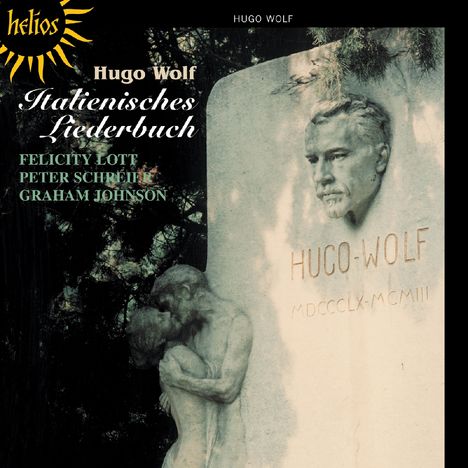Hugo Wolf: Italienisches Liederbuch auf CD
Italienisches Liederbuch
Herkömmliche CD, die mit allen CD-Playern und Computerlaufwerken, aber auch mit den meisten SACD- oder Multiplayern abspielbar ist.
Lassen Sie sich über unseren eCourier benachrichtigen, falls das Produkt bestellt werden kann.
Ähnliche Artikel
Wiederveröffentlichung von Hugo Wolfs immer wieder ergreifendem „Italienischem Liederbuch“ in der vielfach gerühmten Aufnahme mit Felicity Lott und Peter Schreier aus dem Jahre 1994.
Product-Information:
When we encounter this work for the first time, we discover a new song landscape – a delightfully hybrid country where Italian folk earthiness is wedded to the highest German art. Wolf had already proved himself a giant of the lied in his settings of Mörike (1888), Goethe (1888 / 9) and others, and he had long been adept at inspired syntheses of word and tone. But by 1890 the composer had reached a phase in his life where he no longer needed the monumental grandeurs of German literature to achieve his ends. He had already turned his gaze south to the Mediterranean; the songs of the Spanisches Liederbuch strike a new hedonistic note in his work. But the surprise of the Italienisches Liederbuch (translations by Paul Heyse of essentially anonymous folk lyrics drawn from collections by Tommaseo, Tigri, Dalmedico and others) is that the composer also delights in the joys of Lilliput, and ‘Auch kleine Dinge …’, the opening song in the set, is the very work to declare his new miniaturist sympathies.
Rezensionen
‘If I had to live with only one Italienisches Liederbuch, it would have to be that belonging to Lott, Schreier and Johnson’ (BBC Music Magazine)
'Artistically consummate' (Classic CD)
'An exceptional recording' (The Independent)
'An artistically consummate performance. These musicians bring an immediacy and intimacy, to both text and music, which is thrilling' (BBC Music Magazine Top 1000 CDs Guide)
Rezensionen
C. Höslinger in FonoForum 3/95: "Kaum jemals aber wurde das "Italienische Liederbuch" so behutsam, so übergründlich behandelt wie vom Trio Johnson-Lott-Schreier. Klangbild:Offen, präsent, gute Differenzierung."Disk 1 von 1 (CD)
Italienisches Liederbuch (46 Lieder v. Heyse nach Leopardi, Giusti, Carducci, Negri)
-
1 Nr. 1 Auch kleine Dinge können uns entzücken
-
2 Nr. 2 Mir ward gewsagt, du reisest in die Ferne
-
3 Nr. 3 Ihr seid die Allerschönste
-
4 Nr. 4 Gesegnet sei, durch den die Welt entstund
-
5 Nr. 5 Selig ihr Blinden
-
6 Nr. 6 Wer rief dich denn?
-
7 Nr. 7 Der Mond hat eine schwere Klag erhoben
-
8 Nr. 8 Nun laß uns Frieden schließen
-
9 Nr. 9 Daß doch gemalt all deine Reize wären
-
10 Nr. 10 Du denkst mit einem Fädchen mich zu fangen
-
11 Nr. 11 Wie lange schon war immer mein Verlangen
-
12 Nr. 12 Nein, junger Herr
-
13 Nr. 13 Hoffärtig, seid Ihr, schönes Kind
-
14 Nr. 14 Geselle, wolln wir uns in Kutten hüllen
-
15 Nr. 15 Mein Liebster ist so klein
-
16 Nr. 16 Ihr jungen Leute, die ihr zieht ins Feld
-
17 Nr. 17 Und willst du deinen Liebsten sterben sehen
-
18 Nr. 19 Wir haben beide lange Zeit geschwiegen
-
19 Nr. 18 Heb auf dein blondes Haupt
-
20 Nr. 20 Mein Liebster singt
-
21 Nr. 21 Man sagt mir, deine Mutter woll es nicht
-
22 Nr. 22 Ein Ständchen Euch zu bringen
-
23 Nr. 23 Was für ein Lied soll dir gesungen werden
-
24 Nr. 24 Ich esse nun mein Brot nicht trocken mehr
-
25 Nr. 25 Mein Liebster hat zu Tische mich geladen
-
26 Nr. 26 Ich ließ mir sagen und mir ward erzählt
-
27 Nr. 27 Schon streckt ich aus im Bett die müden Glieder
-
28 Nr. 28 Du sagst mir, daß ich keine Fürstin sei
-
29 Nr. 29 Wohl kenn ich Euren Stand
-
30 Nr. 30 Laß sie nur gern, die so die Stolze spielt
-
31 Nr. 31 Wie soll ich fröhlich sein
-
32 Nr. 32 Was soll der Zorn, mein schatz
-
33 Nr. 33 Sterb ich, so hüllt in Blumen meine Glieder
-
34 Nr. 34 Und steht ihr früh am Morgen auf
-
35 Nr. 35 Benedeit die selge Mutter
-
36 Nr. 36 Wenn du, mein Liebster, steigst zum Himmel auf
-
37 Nr. 37 Wie viele Zeit verlor ich, dich zu lieben
-
38 Nr. 38 Wenn du mich mit den Augen streifst
-
39 Nr. 39 Gesegnet sei das Grün
-
40 Nr. 40 O wär dein Haus durchsichtig wie ein Glas
-
41 Nr. 41 Heut Nacht erhob ich mich im Mitternacht
-
42 Nr. 42 Nicht länger kann ich singen
-
43 Nr. 43 Schweig einmal still
-
44 Nr. 44 O wüßtest du, wie viel ich deinetwegen
-
45 Nr. 45 Verschling der Abgrund meines Liebsten Hütte
-
46 Nr. 46 Ich hab in Penna einen Liebsten wohnen
Mehr von Hugo Wolf
-
Hugo WolfStreichquartett d-mollCDAktueller Preis: EUR 7,99
-
Hugo WolfOrchesterliederCDVorheriger Preis EUR 17,99, reduziert um 0%Aktueller Preis: EUR 7,99
-
Hugo WolfDas Fest auf Solhaug (Schauspielmusik)Super Audio CDAktueller Preis: EUR 7,99
-
Hugo WolfManuel Venegas (Opernfragment)2 CDsAktueller Preis: EUR 7,99









